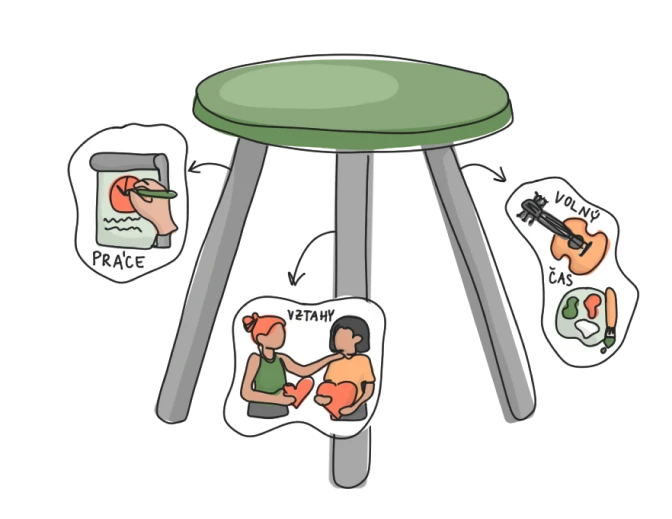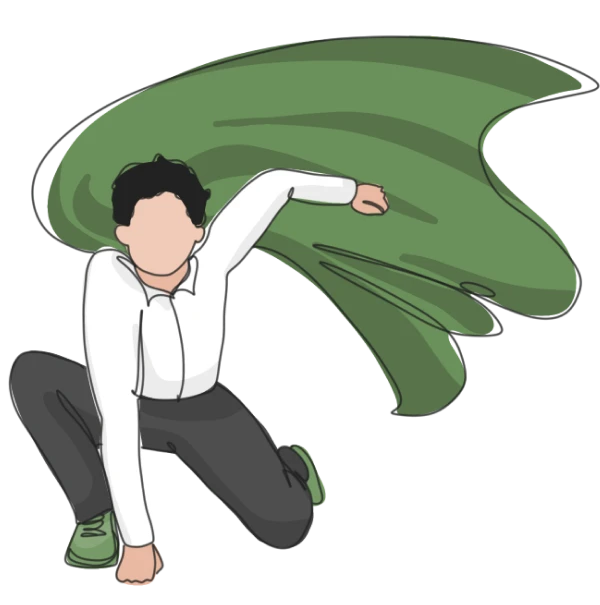What is burnout syndrome?
Burn-out syndrome or burnout syndrome is defined by ICD 11 (International Classification of Diseases) as the result of chronic workplace stress that has not been managed.
However, it is not defined as a diagnosis, but only as a "working phenomenon". However, the things that can accompany burnout syndrome, such as depression or anxiety, are already diagnoses.
But...does burnout really only affect employees?
NOwhether you're an employee or a worker, and whether you're a student, a carer or a parent... burnout can happen to you. And anyone who says it can't, probably hasn't gone through burnout.
How do we know him?
Christina Maslach, professor and researcher on burnout syndrome, described three main dimensions of burnout symptoms. They are:
- exhaustion (feelings of loss of energy)
- emotional distance from work (negative and cynical feelings associated with work)
- self-doubt ("I'm not good enough")
But that's certainly not all. In general, the symptoms of burnout syndrome could be observed on several "life planes":
- WORKING (the idea of going to work irritates me, no one appreciates the work I do)
- PERSONAL - RELATIONSHIPS AND HOBBIES (I don't have the energy for the hobbies I used to love anymore, I don't feel like seeing my friends)
- PSYCHIC (nothing makes sense, I'm constantly stressed, experiencing depressive/anxiety states or even panic attacks)
- PHYSICAL (my back hurts, I suffer from migraines, I can't sleep) - visits to the doctor end with "you're fine")
What burnout syndrome is not?
We already know from the original definition that burnout is a chronic, therefore necessarily a long-term process, so burnout does not happen overnight. It is preceded by neglecting our own needs and ignoring the signals of our body and mind.
Sometimes we feel:
- Under stress
- Tired
- Exhausted
- Helpless
We all experience these states from time to time, but when they occur:
- Long term
- Together
- to a high degree
You need to be alert - they can be a symptom of burnout syndrome.
So how does it happen that we burn out?
On the contrary, when you enjoy your work and feel it's "the right thing", you can devote more and more time to it - you put more and more demands on yourself and start to forget yourself. And that can be the first sign of burnout.
What are the stages:
1st honeymoon
We enjoy our work, we are excited about it, everything is sunny, we have energy
2. stress phase
We start to get stressed, less productive, more tired, but we still "make it" and are in control
3. chronic phase
We are stressed every day and it doesn't even occur to us anymore, apathy and procrastination sets in and we withdraw into ourselves
4. burnout
In the worst case, a complete collapse, serious health problems or even hospitalization
Now we can easily imagine what a "recipe for burnout" would look like:
(ALERT: the result of this recipe is strongly not recommended)
- Let's make excessive demands on ourselves
- Add to that a (large) dash of high accountability
- Combine all this with low competence & low levels of control (powerlessness)
- Let's spice it up:
- time pressure
- Conflicts
- stereotypes
- intensive contact with people
Preventing burnout
Now that we know what burnout syndrome is and how to recognize it, the question becomes how to prevent it.

tripod prevention
aka small steps that can accomplish great things
Imagine a tripod. To be completely stable, it needs three solid legs. If one leg is removed, the tripod is still standing, but it is not completely stable. Remove one more leg and the stool collapses.
legs are: work, relationships and interests with rest.
1. Leg - work
What you can do on a professional level to keep from burning out.
- Remember - it's still "just" a job.
- Communicate and communicate - a cliché? NO! Even an uncomfortable conversation is better than boiling your grievances and discontent like in a pap.
- When things go wrong - remember that the brain fixates on negative things. Just because 1 thing went wrong doesn't mean there aren't 9 more,
that have been successful. - Set goals, but remember: a. there are only 24 hours in a day, b. you can never please everyone.
- Take (micro) breaks - and when you do, try to get up from your desk and think about something else.
- Find a place of refuge (meeting room, toilets) where you can hide and calm down.
- Beware of over-involvement.
- Stop doing multiple things at once - focus on one thing.
- Break down big tasks and projects into smaller, achievable parts and goals.
2nd leg - relationships
- Shared joy is double joy, shared sorrow is half sorrow - talk about your feelings.
- Support your colleagues, partners and friends - but let yourself be supported and praised too.
- Every day can't be rosy - the beauty of relationships is weathering the bad together.
- Smile at others - sometimes just like that.
- Learn to say "no" - it doesn't mean you're a bad person.
- Learn to ask for help - some things are better with two people.
- Don't try to change people, because often you can't - we can only change our attitude/relationship to them.
- Maintain relationships with people who energize you for the long term. It's better to have one true friend than many bad ones.
- Avoid toxic people and situations. Imagine it's like walking into a dark alley in the middle of the night, you'd rather avoid it too.
Leg 3 - FUN & RECREATION
- Recharge your batteries with your hobbies - whether it's reading a book or dancing.
- Make time for your hobbies, ideally every day - even if it's for 20 minutes.
- Move your skeleton - even 10 minutes a day has been proven to have an effect.
- Rest - it's not healthy or productive to give your best 24/7.
- Sleep - air out before bed, don't look at your phone or computer for at least an hour, and write out whatever might be on your mind.
but where it all begins and ends is with YOU
You are the one in the middle and you have influence over all other aspects of your life. Therefore:
- Be mindful -> listen to your body, it will speak up when it starts to get tired -> don't ignore it (rest, get enough sleep, ...)
- Be grateful -> every night, tell yourself one thing you're grateful for
- Be present -> it's nice to get off autopilot and be in the here and now (whether alone to reflect or be with friends)
As Dr. Ptacek would say: every day, let's remember to occasionally unplug our "dischargers" and plug in our "chargers."
Remember:
Start with one small thing, and as you feel up to it, you can build up the steps.
The topic of sustainability should not only be discussed in the context of nature, but also in relation to the habits in our lives - we don't want to be cool in the short term -> set your routine so that it is pleasant and sustainable for you!
What if I'm already burnt out?
- Ask for help - whether from friends, family or a professional.
- Evaluate what your options are - try to adjust your work schedule (flexibility), talk to colleagues or boss about how work could be adjusted, delegate what you can
- Give it time - if you can, take some time off, rest properly and don't try to rush your recovery
- Be kind & gracious to yourself - life is like a roller coaster, sometimes we are up and sometimes we are down. It's okay to feel "crappy" sometimes, it's not a sign of weakness.
- Remember, just because you've burned out doesn't mean you can't "flare up" again!
Where to get professional help?
We have developed a simple map of available help to combat burnout.
